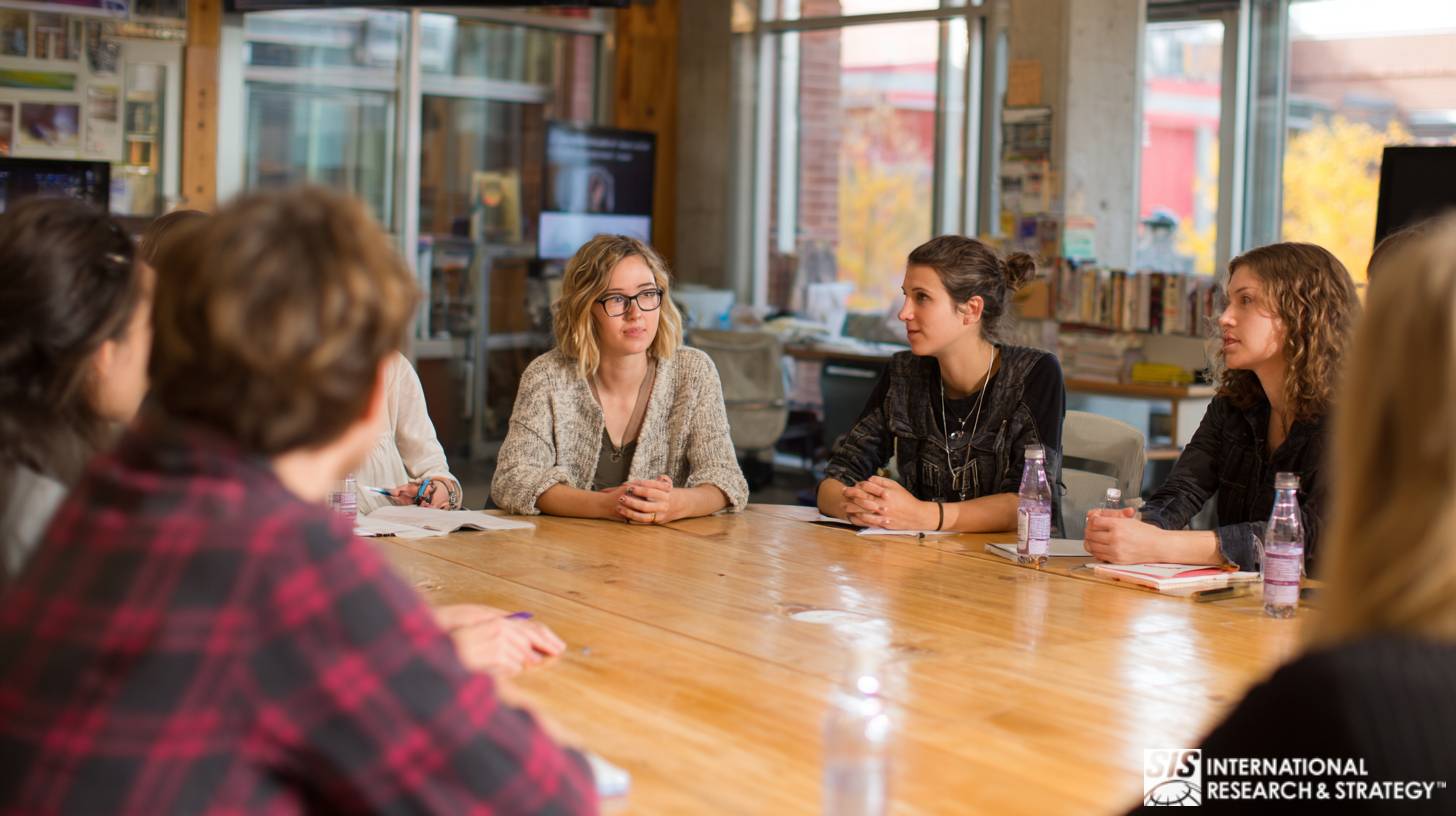Focus Groups in London

Focus groups in London are one of the most powerful tools available to businesses seeking a deeper understanding of their customers.
Have you ever felt that despite all the data you’ve gathered, something’s missing in your understanding of your market? As someone who has spent over 40 years in market research, I can tell you that the best way to truly understand your audience is through focus groups. No other research method provides such in-depth insights into your target consumers’ attitudes, emotions, and opinions.
table of Contents
What’s the Point of Conducting Focus Groups In London?
Grupos de enfoque are moderated discussions with 8–10 people from a target market (a small, diverse group of people interested in a standard product, service, or idea). As a moderator, we develop a vibrant, open discussion space that probes why people think what they do and make their own decisions. This is particularly true for the feeling you get with a product, service, or marketing message, and how that motivates you to behave.
I have heard of focus groups that have saved companies tens of millions of dollars. For example, in our work with Toyota to assess consumer attitudes toward hybrid cars, we used focus groups in target markets to explore prospective buyers’ concerns about electric vehicles. This qualitative feedback helped Toyota fine-tune its messaging and marketing strategy and companies to better explain the advantages of hybrid technology and, in turn, position its brand more effectively in the crowded automotive landscape.
Why London is Ideal for Focus Groups

It’s not surprising; London is one of the world’s most vibrant and multicultural cities, making it an ideal environment to run focus groups. It is home to a diverse array of people from different socioeconomic, cultural, and demographic backgrounds.
Having conducted focus groups here for more than 40 years, I know it is a gold mine of actionable insight. Whether it involves insight into the luxury market for brands like Rolls-Royce or sentiment analysis on tech innovations for clients like Samsung, the city offers an unparalleled breadth of access to in-depth, cross-segment understanding of consumer behavior.
In a Nutshell, the benefits of conducting focus groups in London are:
- Diverse Opinions: You can hear from a variety of perspectives that you may not find in other locations. London gives businesses access to local and international viewpoints, making it easier to understand how a global audience might receive a product or service.
- Targeted Feedback: Focus groups provide nuanced feedback that surveys simply can’t. You can probe deeper into the emotions, motivations, and reasons behind a participant’s opinions, which helps you craft more personalized marketing strategies or product improvements.
- Real-time Data: London is a constantly evolving city, and its consumers are often ahead of global trends.
For example, when we worked with BMW to assess consumer perceptions of autonomous driving technology, we conducted focus groups in London to understand how British consumers felt about this innovative technology. The feedback from these groups allowed BMW to refine its messaging and product development to better meet consumer expectations.
London’s Key Industry Sectors: Market Data Across Industries
| Industry Sector | Market Statistics & Impact |
|---|---|
| HealthTech Industry | The UK HealthTech sector generates £34 billion in annual turnover and employs over 150,000 professionals. There are 4,360 HealthTech companies in the UK with a combined turnover of £48 billion Fuente: Association of British HealthTech Industries |
| Life Sciences Sector | The UK life sciences industry generates over £70 billion in total annual turnover, with £30 billion from exports. The industry employs 196,000 people across 4,360 companies Fuente: Pharmaceutical Technology – UK Healthcare Industry |
| Medical Technology Manufacturing | The UK medical technology sector generates an annual turnover of approximately $33 billion (£26 billion), with industry revenue reaching £7.4 billion at a 3.2% CAGR over five years Fuente: US Trade.gov – UK Medical Technology |
| Industrias creativas | London’s creative industries generated £42.0 billion in GVA, representing 11.9% of all jobs in the capital with 622,600 positions. The sector grew 38.2% since 2009, outpacing overall London economy growth Fuente: London Datastore – Creative Industries Update |
| Fashion & Textiles | London’s fashion and textile industry supports one job in every 23, contributing £11 billion in GVA and supporting over 200,000 jobs. The broader UK fashion industry contributed £32.3 billion to the economy and supports 890,000 jobs Fuente: UKFT – London Fashion & Textile Report |
| Design & Designer Fashion | There were an estimated 171,000 UK jobs in design and designer fashion, generating £3.5 billion in GVA. Fashion contributes £5.5 billion to London’s economy through design, manufacturing, retail, and media activities Fuente: Creative Industries – Fashion Economy Facts |
| Sector manufacturero | London employs approximately 250,000 residents in manufacturing industries, though this represents only 2.8% of London’s population—the lowest proportion in the UK. The sector has transformed from 1.5 million employees in 1960 Fuente: UNCSBRP – London Manufacturing Industry |
| Biopharmaceutical Sector | The Core Biopharma sector employs 66,000 people with turnover of £40.6 billion. Contract Manufacturing & Research Organizations employ 20,100 people, nearly doubling from 13,500 since 2008 Fuente: UK Government – Bioscience Statistics |
| Digital Health Segment | Digital health is the medical technology segment with highest employment at 18,900 people, accounting for 6% of all life sciences employment. It has 10% CAGR growth, the 4th highest in the sector Fuente: UK Government – Bioscience & Health Tech Statistics |
| Creative Industries Productivity | London’s creative industries are highly productive with £71,400 GVA per workforce job, which is 22.2% higher than the London economy average and 35.5% higher than UK creative industries overall Fuente: London Datastore – Creative Industries Update |
| IT & Software Services | IT, software and computer services accounts for the largest share of London’s creative industries output, contributing 38.0% of the sector’s GVA and accounting for over half of its growth since 2009 Fuente: London Datastore – Creative Industries Update |
| Life Sciences R&D Activity | There were 2,600 life sciences sites engaged in R&D activity, representing 33% of all UK life sciences sites. The UK has the strongest clinical trials pipeline in Europe across all pre-clinical and clinical stages Fuente: UK Government – Bioscience & Health Tech Statistics |
| Creative Industries Employment Growth | London’s creative economy employment grew by 24.2% between 2012-2016, significantly higher than London overall (14.4%) and the sector in rest of UK (16.5%). There are 882,900 jobs in the wider creative economy Fuente: London Datastore – Creative Industries Update |
| Fashion Manufacturing Excellence | Over half the designers showing at London Fashion Week make some of their collections in the UK. London has 20,000 people directly engaged in creating and making fashion and textile products Fuente: UKFT – London Fashion & Textile Report |
Why London’s Diverse Demographics Make It a Focus Group Goldmine
London speaks over 300 languages. Walk through any neighborhood and you’ll encounter cultures, perspectives, and consumer behaviors that simply don’t exist anywhere else in the UK.
This diversity is your competitive advantage when running focus groups in London. You’re accessing a microcosm of global consumer behavior without leaving one city. Test your concept here, and you’re essentially stress-testing it against multiple cultural viewpoints simultaneously.
What makes London participants different:
- Early adoption patterns: Londoners typically embrace new technologies and trends 6-8 months before they hit mainstream UK markets
- Sophisticated skepticism: These folks have been relentlessly marketed to. They spot authenticity gaps faster than anywhere else
- Global mindset: Many participants compare products not just to UK competitors but to international standards they’ve experienced
- Higher expectations: The bar is simply higher across categories—from food to fintech
- The predictive advantage: Focus groups in London often signal where broader markets are heading. If Gen Z Londoners are abandoning a behavior or embracing a trend, you’ve got an early warning system. That predictive power is worth its weight in gold for product roadmaps.
Online vs. In-Person Focus Groups: What Works Best for London Research
The pandemic accelerated online research adoption, but now we’re in a more nuanced phase: understanding when each format genuinely works better for focus groups in London.
In-person focus groups still dominate for specific needs:
Product testing with physical items. Taste tests. Tactile experiences. Complex emotional discussions where reading body language matters. High-value projects where relationship building between participants drives insights.
When you need participants for focus groups in London to handle products, smell fragrances, or interact with physical prototypes, online simply can’t deliver. A beauty brand discovered packaging texture influenced purchase intent more than visual design—insight they’d have completely missed online.
The in-person advantage for sensitive topics:
- Discussing financial anxieties, health concerns, or personal experiences often works better face-to-face.
- The trust built in a room with real humans can’t quite replicate virtually.
- Participants in focus groups in London reported feeling more comfortable sharing vulnerable perspectives when physically present with others having similar experiences.
When online focus groups excel:
- Geographical diversity without travel requirements.
- Participants uncomfortable in group settings.
- Topics that don’t require physical interaction.
- Projects with tight timelines or budgets.
- International participants joining the London-based research.
Synchronous vs. asynchronous online options:
Live video sessions (synchronous) maintain group energy and allow real-time follow-up. Discussion boards or diary studies (asynchronous) give participants time to reflect and respond thoughtfully. Each serves different research objectives for focus groups in London.
Asynchronous works well when you need considered responses over several days. Synchronous better captures immediate reactions and group dynamics.
Technology requirements participants can actually handle:
Don’t assume everyone’s tech-savvy, even in London. Clear instructions, tech checks before sessions, and backup plans for connectivity issues are non-negotiable.
Hybrid models that combine strengths:
Start with online focus groups in London to test broad concepts. Use insights to refine approaches. Follow up with targeted in-person sessions on the most promising directions. This staged approach maximizes budget efficiency while maintaining insight quality.
Participant preference matters:
London professionals often prefer online options—no commute, participate from home, easier to fit around demanding schedules. Parents with childcare challenges strongly favor remote participation. Students and creatives might actually prefer the social aspect of in-person focus groups in London.
Opportunities In Focus Groups In London
London offers significant opportunities for businesses seeking valuable insights through focus groups. Let me share a few reasons why:
Access to a Diverse Consumer Base: The population of London is a microcosm of international consumers, giving access to multiple income levels, cultural backgrounds, and age groups. This diversity is a great asset for businesses looking to know new market parts.
Cross-Cultural Insights: London’s position as a global city means it attracts people from around the world. By conducting focus groups here, businesses can gain insights into how products, services, or brands resonate with multicultural populations, which is especially beneficial for global companies looking to tailor their offerings to different regions.
Mayor participación del consumidor: Londoners are often early adopters of new trends and technologies. As such, businesses can test innovative concepts and gather valuable feedback from consumers more likely to be open to new ideas and experiences.
Ability to Segment and Target Specific Audiences In London, you can segment focus groups by precise criteria such as income, education, geographical location, and lifestyle. This allows you to tailor your focus groups to get more granular insights about specific market segments.
Access to a Highly Educated Population London has many university graduates and professionals, which can be particularly beneficial for industries such as technology, finance, and education.
Effective Brand Positioning and Rebranding London is an excellent place to measure brand perception, test how well your brand speaks to various consumer segments, and if your brand messaging should be fine-tuned. I’ve noticed brands, such as Samsung, use focus groups in London to help recalibrate their brand positioning to appeal to a domestic and global audience.
Challenges of Conducting Focus Groups in London

While London offers many opportunities for market research, there are also some challenges that companies must consider when planning focus groups in the city, including:
- High Costs of Research London is one of the world’s most expensive cities, and focus groups here don’t come cheap. Costs can add up quickly between recruitment, venue rental and compensating participants… But, as I’ve noted in my own work, investing in quality insights pays off when it helps create more effective marketing strategies that drive higher ROI.
- Cultural Bias and Diversity Management Group members may have their own cultural biases that will impact the conversation and directly affect how accurately the data you collect reflects reality. Minimizing groupthink, or these skew responses, takes careful moderation. SIS has found ways to mitigate this by diversifying the focus group participants themselves and using trained moderators to help guide the discussions.
- Recruitment and Scheduling Difficulties Assembling a group of participants can be time-consuming given the busy schedules of city dwellers. Londoners are usually busy in their corporate lives, so they may be less inclined to agree to a focus group, especially when it takes place during the weekdays.
What Makes SIS International a Top Focus Group Research Company
After more than 40 years of experience in market research, I can confidently say that what separates SIS Internacional from other firms in the industry is our commitment to delivering actionable insights, backed by a deep understanding of diverse global markets and the latest research methodologies. We offer:
- Affordable and Cost-Effective Solutions
One of the things I’ve always prioritized at SIS is affordability without sacrificing quality. Conducting focus groups can be expensive in a high-cost city like London, but we work hard to ensure our clients receive the best value for their investment. We achieve this by using efficient recruitment techniques, leveraging our global network to find the right participants, and minimizing overheads wherever possible. - Increase Client ROI with Targeted Insights
By conducting well-structured focus groups, we help businesses identify consumer pain points, refine product offerings, and improve marketing strategies. I’ve seen many of our clients experience increased ROI after gaining deeper consumer understanding through focus groups, as they can target their efforts more effectively and make more informed decisions. - Global Experience with Local Expertise
Our specialists are based worldwide and are highly attuned to regional nuances, especially in diverse markets like London. We ensure that our focus group research considers local cultural factors and consumer behaviors, resulting in relevant and actionable insights. - Cutting-Edge Research Methodologies
We are always on the cutting edge of new research techniques, leveraging the latest technology to enhance the quality of our focus groups. Over the years, I’ve seen how adapting to new technologies can improve the quality of our research and provide our clients with a competitive edge. - Expert Moderators with Extensive Experience I am extremely proud of the team of expert moderators we have here in SIS who have been working with focus groups in many industries for decades. They’ve been critical to our success by pulling out the nuanced insights, while fostering an open, comfortable atmosphere for participants.
- A Proven Track Record with Leading Clients
SIS has worked with many notable clients over the years across many industries. We have done focus groups for global brands like IBM, Toyota, Samsung, and L’Oréal, fine-tuning their products and strategies. These enduring relationships have allowed us to refine our approach over time and come up with strategies that are demonstrably delivering real business results. - Comprehensive Post-Study Analysis and Reporting
Our extensive post-study analysis is one aspect of SIS International that separates us from our competitors and makes us exceptional. It includes recommendations for product development, marketing strategies and other business decisions — our detailed reports guide our clients in determining the best path forward with clarity and confidence.
Frequently Asked Questions About Focus Groups in London
Q: What are focus groups in London?
Focus groups in London are moderated discussions with a small group of participants, typically targeted to represent a specific demographic or consumer segment. They gather qualitative data on consumer perceptions, attitudes, and behaviors.
Q: Why should I conduct focus groups in London specifically?
Conducting focus groups in London allows companies to tap into a wide range of perspectives and gain an understanding of the preferences, challenges, and attitudes of both local and international audiences.
Q: How do focus groups help businesses?
Focus groups provide businesses with in-depth qualitative insights that surveys or quantitative methods can’t capture. They allow businesses to understand the “why” behind consumer behavior, explore attitudes toward new products or services, and uncover potential issues before launch.
Q: What are the key benefits of focus group research?
Focus groups offer several benefits:
- Rich insights into consumer behavior and attitudes
- Understanding emotional responses to products, brands, or ads
- Detailed feedback on prototypes or concepts
- Exploration of group dynamics and social influences
Q: How long do focus groups typically last?
Focus groups usually last between 60 and 90 minutes, depending on the depth of discussion required. The duration allows enough time for participants to express their opinions while keeping the group engaged.
Nuestra ubicación de instalaciones en Nueva York
11 E 22nd Street, Piso 2, Nueva York, NY 10010 T: +1(212) 505-6805
Acerca de SIS Internacional
SIS Internacional ofrece investigación cuantitativa, cualitativa y estratégica. Proporcionamos datos, herramientas, estrategias, informes y conocimientos para la toma de decisiones. También realizamos entrevistas, encuestas, grupos focales y otros métodos y enfoques de investigación de mercado. Póngase en contacto con nosotros para su próximo proyecto de Investigación de Mercado.
